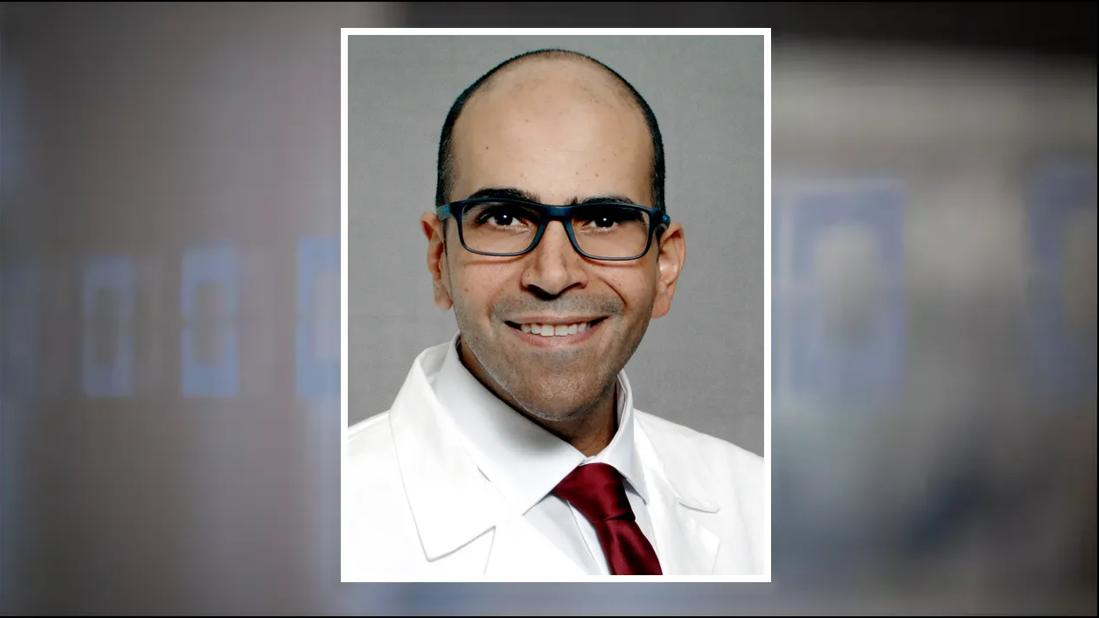Dr. Amre Nouh shares priorities and insights on issues facing the stroke community

Amre Nouh, MD, MBA, FAHA, Chair of Neurology for Cleveland Clinic in Florida, is taking on a new role as Chair of the Stroke and Vascular Neurology Section for the American Academy of Neurology (AAN), the world’s largest association of neurologists and neuroscience professionals.
Advertisement
Cleveland Clinic is a non-profit academic medical center. Advertising on our site helps support our mission. We do not endorse non-Cleveland Clinic products or services. Policy
Dr. Nouh has held many notable leadership positions throughout his career. A fellow of the American Heart Association (AHA), he was lead author and Vice-Chair of the AHA Scientific Statement on best practice recommendations for patients who experience in-hospital stroke. He is past-chair of the Northeast Cerebrovascular Consortium, an independent organization dedicated to improving stroke care across eight states, and was part of a legislature-appointed Stroke Task Force in Connecticut created to improve acute stroke care statewide.
Among his most important contributions to the field of neurology, says Dr. Nouh, is training many residents, fellows and students. He has served as a mentor for many who have gone on to conduct leading research and head up neurology programs across the country.
In this Q&A with Consult QD, Dr. Nouh shares the goals for his two-year term chairing the Stroke and Vascular Neurology Section, which begins in April 2025, as well as insights on issues facing the stroke community.
A: I’m very excited to be part of this large community working at a national level to promote brain health for all. The magic happens when minds come together to create an impact, and I’ve always found that I work best in a collaborative environment, like the one we have at Cleveland Clinic. I will use this approach during my time as Chair to bring stakeholders together to focus on three key pursuits.
I will prioritize advocacy for patients and caregivers, focusing on ways we can improve access to research, education and treatment. In particular, I think there is more we can do to support patients as they navigate life after stroke.
Advertisement
I also want to ensure my peers remain well-informed, supported and empowered. This will entail promoting awareness about the resources available to them and communicating the important advancements in stroke care that are shifting the treatment landscape. For example, we used to have just a few hours after symptom onset to treat patients with large vessel occlusion (LVO) stroke and achieve good functional outcomes, but now we’ve extended the treatment window to 24 hours for certain patients.
Lastly, I look forward to partnering with AAN members, industry leaders and other stakeholders to advance technology and services for patients. This includes fostering collaborations with researchers and physicians in the community.
A: We are in a different era of stroke care as a result of artificial intelligence and big data. AI has been used for years to augment stroke imaging. With it, we can improve diagnostic accuracy, treatment planning, and patient outcomes. Today AI software can quickly review a scan to detect a large vessel occlusion and alert a team of specialists, including neurologist, radiologist and surgeon, who will develop the treatment plan and remove the clot. This saves precious time and brain function.
The application of AI machine learning to improve patient outcomes was an area of focus when I earned my executive MBA from MIT Sloan School of Management. I’m very excited about its potential to advance various aspects of stroke treatment, including detection, segmentation, classification and prognostication. This will only get better and more broadly adopted, and the timing is critical as our aging population is being met by fewer physicians.
Advertisement
A: As a researcher, I’m focused on expanding treatment options for LVO stroke, investigating the causes of stroke in young adults, and improving post-stroke care. I’m particularly concerned with the alarming increase of stroke in young adults. We are seeing a disproportionate increase in stroke over heart disease in patients aged 18–55 years, and novel and emerging risk factors may be at play.
Here at Cleveland Clinic in Florida, our regional stroke group recently conducted a literature review to explore the potential role of male sex hormones and stroke risk. We looked for plausible underlying pathophysiological mechanisms associated with using exogenous testosterone, noting gaps in research about safety and long-term effects on young patients.
For more information, visit Cleveland Clinic Florida ConsultQD. Subscribe to the Florida Physician Newsletter.
Additionally, follow us on X (formerly Twitter), Facebook, and LinkedIn.
Advertisement
Advertisement

Nonthermal technique reduces bleeding and perforation risk

Standardizing a minimally invasive approach for Barrett’s Esophagus and Esophageal Cancer

PSMA-targeted therapy for metastatic prostate cancer now offered at Cleveland Clinic Weston Hospital

Nationally recognized urologic oncologist offers vision for growth, innovation, and excellence

Noninvasive modality gains ground in United States for patients with early-to-moderate disease

Cleveland Clinic Weston Hospital’s collaborative model elevates care for complex lung diseases

Interventional pulmonologists at Cleveland Clinic Indian River Hospital use robotic technology to reach small peripheral lung nodules

Trained in the use of multiple focal therapies for prostate cancer, Dr. Jamil Syed recommends HIFU for certain patients with intermediate-risk prostate cancer, especially individuals with small, well-defined tumors localized to the lateral and posterior regions of the gland.